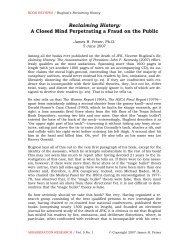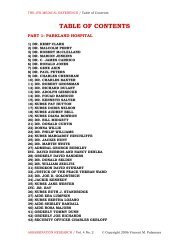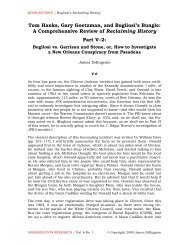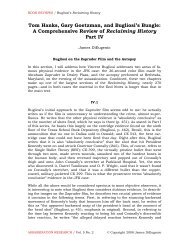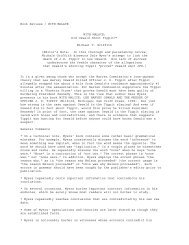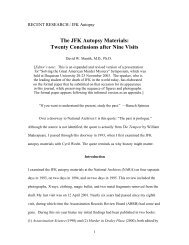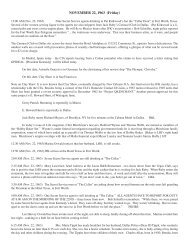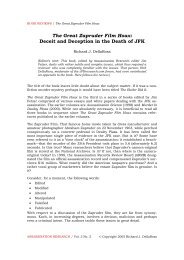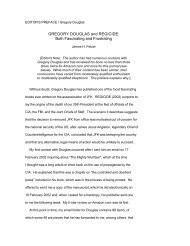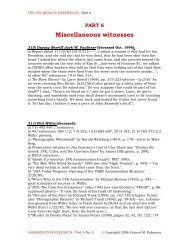A Comprehensive Review of Reclaiming History Part VIII
A Comprehensive Review of Reclaiming History Part VIII
A Comprehensive Review of Reclaiming History Part VIII
Create successful ePaper yourself
Turn your PDF publications into a flip-book with our unique Google optimized e-Paper software.
James DiEugenio 6 Bugliosi’s Bungle, <strong>Part</strong> <strong>VIII</strong><br />
hours, Rankin now became the consensus choice. Warren was outmaneuvered<br />
since Ford and Dulles threatened to resign if Olney was appointed (ibid., p. 45).<br />
Rankin was a longtime friend <strong>of</strong> McCloy’s, but he was also a working colleague<br />
<strong>of</strong> Hoover, whom the Director felt he could get along with. Regrettably, Hoover<br />
was right in that regard.<br />
In Breach <strong>of</strong> Trust, McKnight spends about four pages on this key episode. Bugliosi<br />
deals with it in three paragraphs (pp. 327–8). In his discussion <strong>of</strong> it, he<br />
leaves out the role <strong>of</strong> Ford as the FBI informant; he leaves out the work <strong>of</strong><br />
Hoover and De Loach in lobbying the Commission; and, most importantly, he<br />
ignores the maneuvering <strong>of</strong> McCloy, Dulles, and Ford to veto Olney, and enlist<br />
Rankin, the more palatable FBI candidate.<br />
There may be a reason why Bugliosi blurs and discounts the above: it betrays<br />
what the real balance <strong>of</strong> power was on the Commission. Contrary to Bugliosi’s<br />
insinuation, Richard Russell and John Cooper made no real objection to Warren’s<br />
appointment <strong>of</strong> his own counsel; coming from the Senate, they understood<br />
the chair’s privilege in that regard (McKnight, p. 45). It was McCloy, Ford, and<br />
Dulles who cooperated with the <strong>of</strong>f stage actors—Hoover, Katzenbach, and De-<br />
Loach—to make sure that Olney was not appointed. When broken down and<br />
analyzed, this episode provides a window into what the Commission was really<br />
about, and how it would proceed. What does the window reveal?<br />
1. For all practical purposes, Chief Justice Earl Warren had been made into<br />
a figurehead. Bugliosi mentions how LBJ scared Warren into taking the<br />
job, by suggesting images <strong>of</strong> mushroom clouds and tens <strong>of</strong> millions <strong>of</strong><br />
burnt corpses. But, incredibly, the author makes no comment on how<br />
this fear-mongering could have impacted Warren in his fiduciary function<br />
(p. 324). Yet from the way that Warren reacted to it—tearfully—and<br />
the way he then spoke at the first meeting <strong>of</strong> the Commission, one would<br />
think he clearly got the message: the Kennedy case was not to be dug into<br />
or exposed to the public; if it was, nuclear apocalypse was at hand. As<br />
others have written, the giveaway as to how compromised LBJ made<br />
Warren was the Chief Justice’s famous reply to a question about just<br />
when the public would see all the documents the Commission had seen.<br />
Warren was rather indeterminate: he responded with, “Yes, there will<br />
come a time. But it might not be in your lifetime.” (Anthony Summers,<br />
Conspiracy, p. 101) The reader should note the use <strong>of</strong> the word<br />
“might”. One wonders just how many lifetimes Warren was talking about.<br />
2. The real nexus <strong>of</strong> power within the Commission was made up <strong>of</strong> John<br />
McCloy, Allen Dulles, and Gerald Ford. To anyone who studies American<br />
history, this would have been a predictable grouping. Why it is predictable<br />
is a key point, that is drastically underplayed by Bugliosi. But before<br />
we get to that, let us use some facts to demonstrate that this power center<br />
actually existed and acted. In his micro-study <strong>of</strong> the Commission<br />
hearings entitled The Warren Omission, Walt Brown broke down the proceedings<br />
by attendance and questions posed. The Commission member<br />
who was in attendance at the most number <strong>of</strong> full hearings was Allen<br />
Dulles; and the member who posed the most questions was also Dulles<br />
ASSASSINATION RESEARCH / Vol. 6 No. 1 © Copyright 2009 James DiEugenio



